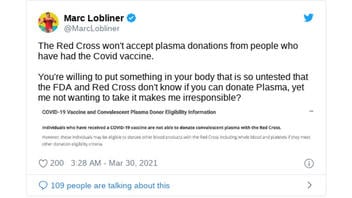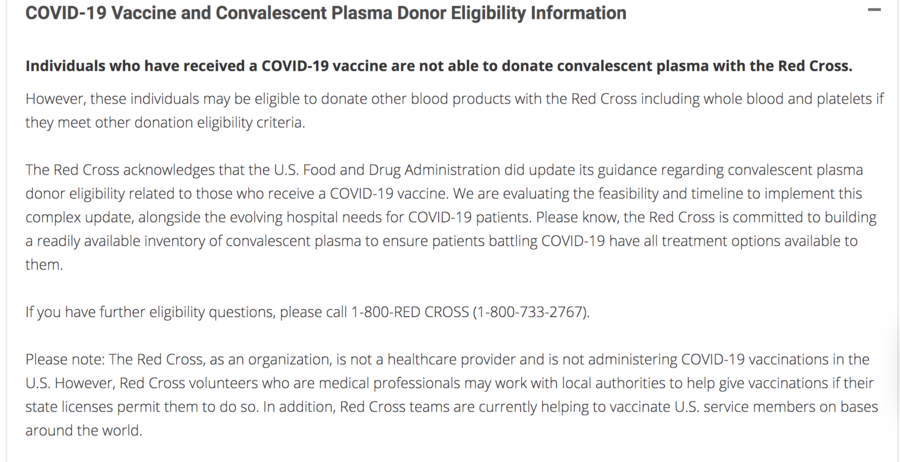
Is the Red Cross not accepting plasma donations from people who have had COVID-19 vaccine? No, that is misleading. There is a difference between the two blood products and Red Cross is still accepting whole blood, platelets and plasma from individuals who have received a COVID-19 vaccine, Jessica Merrill, Red Cross director of communications, told Lead Stories. However, the agency was not, in April 2021, accepting donation from people wanting to specifically give their "convalescent plasma" due to new guidelines released by the Food and Drug Administration, she explained.
The claim originated as a post (archived here) published on Twitter on March 30, 2021. It opened:
The Red Cross won't accept plasma donations from people who have had the Covid vaccine.
This is what the post looked like on Twitter at the time of writing:
(Source: Twitter screenshot taken on Mon Apr 12 20:09:45 2021 UTC)
The tweet continued: "You're willing to put something in your body that is so untested that the FDA and Red Cross don't know if you can donate Plasma, yet me not wanting to take it makes me irresponsible?"
The tweet says the Red Cross is not accepting "plasma" donations, which is incorrect -- there's a difference between plasma and convalescent plasma and the blood bank is still accepting plasma. Convalescent plasma is plasma that is taken from people who have recovered from a disease (COVID-19) and the blood is "presumed to have antibodies for that disease. These antibodies are what helped the person fight off the initial infection," according to Cedars Sinai Medical Center.
The message in the tweet includes a screengrab of a quote from the Red Cross website that clearly states that it is only "convalescent plasma" that is not accepted.
The Mayo Clinic published in an article titled, "Convalescent plasma therapy," and explained it:
Overview
Convalescent plasma (kon-vuh-LES-unt PLAZ-muh) therapy uses blood from people who've recovered from an illness to help others recover.The U.S. Food and Drug Administration (FDA) authorized convalescent plasma therapy for people with coronavirus disease 2019 (COVID-19). The FDA is allowing its use during the pandemic because there's no approved treatment for COVID-19.
Blood donated by people who've recovered from COVID-19 has antibodies to the virus that causes it. The donated blood is processed to remove blood cells, leaving behind liquid (plasma) and antibodies. These can be given to people with COVID-19 to boost their ability to fight the virus.
This is a screengrab of the Red Cross website taken by Lead Stories that is the same as the one in the tweet, just with more information shown.
(Source: Red Cross screenshot taken on Mon Apr 12 20:16:51 2021 UTC)
"We are accepting plasma donations," the Red Cross' Merrill told Lead Stories via telephone on April 12, 2021, adding:
Plasma is a standard blood product that the Red Cross accepts. We support hospitals by providing AB plasma. It is collected and immediately transfused. It is collected with the sheer purpose of transfusion. ... That is the standard blood product that we collect and we support hospital trauma and burn victim patients with it.
Merrill explained why the Red Cross is not accepting convalescent plasma from people who have been vaccinated for COVID-19:
The FDA has outlined a very complicated qualification process. It would require the Red Cross to make a series of updates to our system. We are trying to evaluate the feasibility of implementing it, how long it would take to update it as well as the hospital demand for convalescent plasma.
Merrill told Lead Stories the Red Cross has a solid inventory of convalescent plasma.
The demand has been declining pretty steadily since February. We have been able to collect a significant amount from non-vaccinated individuals, which we see as sufficient inventory to meet the foreseeable demand for convalescent plasma.



















